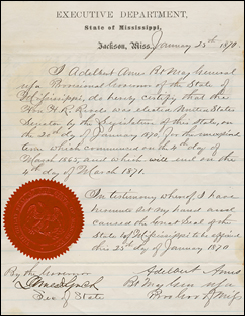Constitution Day 2014
It is The Legal Genealogist‘s mantra:
To understand the records, we have to understand the law that created them.
 But somehow that seems awfully far removed from a lofty document like the Constitution of the United States, doesn’t it? I mean, what really does the Constitution have to do with day-to-day genealogical research anyhow?
But somehow that seems awfully far removed from a lofty document like the Constitution of the United States, doesn’t it? I mean, what really does the Constitution have to do with day-to-day genealogical research anyhow?
Sure, today is the 227th anniversary of the signing of the Constitution,1 and that’s something to celebrate.
But relevant to our research today?
Really?
Really.
In a whole host of ways.
First off, many of us are descended from one or more of the 39 men who signed the Constitution on that September 17th, in 1787.2 Three from Virginia. Eight from Pennsylvania. One from New York. Four from South Carolina. Two from Connecticut. Three from Maryland. Five from Delaware. Three from North Carolina. Two from Massachusetts. Four from New Jersey. Two from Georgia. Two from New Hampshire.3
Checking out their biographies is the ordinary way we might relate genealogical research to the Constitution.
But think about all the other ways the Constitution affected, and affects, the records we look at:
• Who is — and who has been — eligible to serve in the Congress of the United States? The answer to that is found in Article I, §2 for the House of Representatives, and Article I, §3 for the Senate. And every time a member of Congress is seated — every time there has been a fight over whether someone should be seated — there are documents created. See, for example, the documents created when Hiram Rhodes Revels was seated in 1870 as the first African American member of the United States Senate.4
• Why do we have a census enumeration every 10 years? Hint: it’s not just to give genealogists a record of families. It’s to decide which states gain — and which lose — representatives in the House. See Article I, §2.
• Why do we have all those lovely records of the naturalizations of our foreign-born ancestors? Article I, §8 requires that there be a “uniform rule of naturalization” — and though the law allowed state courts to oversee naturalizations for many years, the rules on who could and couldn’t be naturalized all came from the Congress.
• And why do we have all those lovely records of patented inventions and of copyrights right from the very earliest days of the Republic? Because Article I, §8 requires Congress “To promote the progress of science and useful arts, by securing for limited times to authors and inventors the exclusive right to their respective writings and discoveries.”
• Want to see how a President is elected? Remember, we use that Electoral College system, and the records may well reflect our own ancestors’ participation as electors. The tally sheet from the 1824 election of John Quincy Adams is available online.5
• Have ancestors who ever lived in a territory of the United States? It was Article IV, §3 that governed whether and how that territory would ever become a state.
• Who is — and who has been — eligible to vote in federal elections? Well, let’s see here… there’s the 13th Amendment, abolishing slavery; the 14th Amendment, protecting the voting rights of “male inhabitants …, being twenty-one years of age, and citizens of the United States”; the 15th Amendment, prohibiting discrimination “on account of race, color, or previous condition of servitude”; the 19th Amendment, giving women the right to vote; the 24th Amendment, barring the use of a poll tax to limit voting; and the 26th Amendment, making the voting age 18.
And these are just a few of the most obvious records we have because of the Constitution.
So celebrate Constitution Day 2014 — and think about all those lovely documents we can poke around in because it exists.
SOURCES
- See “Constitution Day,” Senate History, United States Senate (http://www.senate.gov/ : accessed 16 Sep 2014). ↩
- See “The Signers of the Constitution,” Teaching With Documents:
Observing Constitution Day, Archives.gov (http://www.archives.gov/ : accessed 16 Sep 2014). ↩ - Rhode Island didn’t send an official delegation to the Constitutional Convention. See “America’s Founding Fathers: Delegates to the Constitutional Convention,” Charters of Freedom, Archives.gov (http://www.archives.gov/ : accessed 16 Sep 2014). ↩
- Credentials of Hiram Rhodes Revels, 01/25/1870, Credentials, 1789-1998; Records of the United States Senate, Record Group 46; National Archives, Washington, D.C.; digital images, OPA – Online Public Access, Archives.gov (http://www.archives.gov/ : accessed 16 Sep 2014). ↩
- Tally of the 1824 Electoral College Vote, 02/09/1825 , Credentials, 1789-1998; Records of the United States Senate, Record Group 46; National Archives, Washington, D.C.; digital images, OPA – Online Public Access, Archives.gov (http://www.archives.gov/ : accessed 16 Sep 2014). ↩



Sunrise here was 6:43 a.m. The flag went up the pole at my house then to celebrate. Love pokin’ through those documents too.
Good for you, John! The documents sure are wonderful… and understanding why they exist, even better!
I had a grade-school teacher who at least twice a week opened the class by saying: “The Constitution of the United States of America is the law of the land; the law of the land is the Constitution of the United States of America.” That sank in, never to be forgotten. Thank you, Mr. J.
And thank you, Judy, for your always valuable explications.
I love your teacher! Good for him! (And you’re most welcome.)
What a wonderful reminder of some of the reasons we should celebrate Constitution Day!
LOTS of good reasons, Dana!